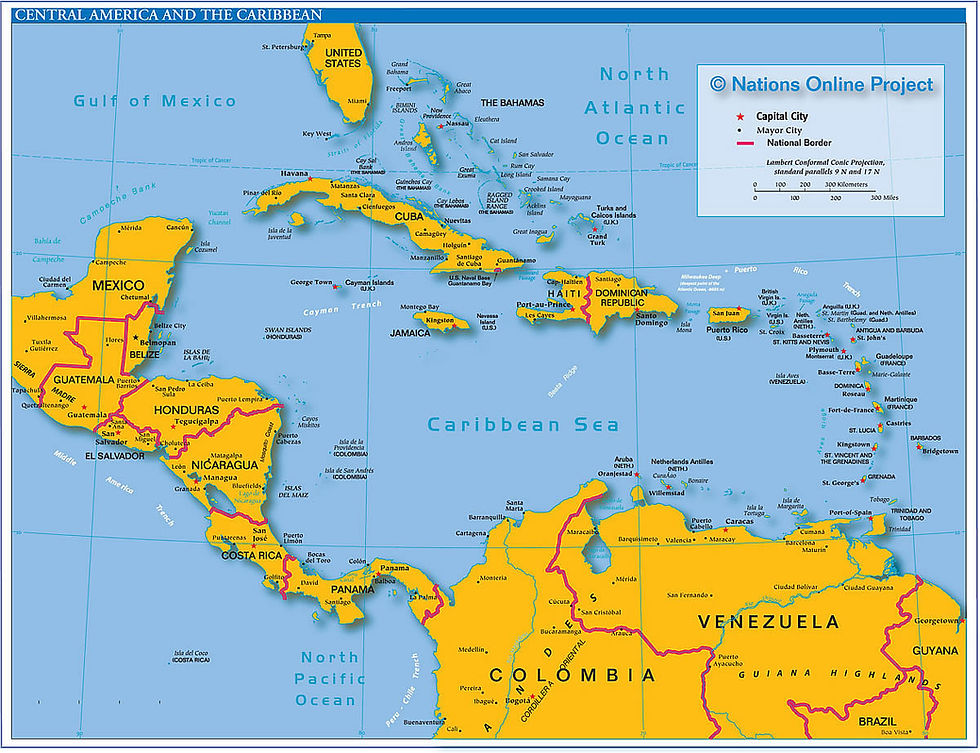The US and China: The Paths not Taken.
- Mark Dworkin
- Jun 25, 2025
- 11 min read
John F. McKeon

Life presents opportunities, some are seized, some slip by unnoticed, most are missed entirely. In January 1945 Mao Tse-tung and Chou En-lai were trying
to change the existing relationship with the United States. Mao Tse Tung had asked to personally come to Washington and meet with President Roosevelt. Roosevelt never responded. (1)
What if Mao and Chou had gone to Washington? Imagine if they had persuaded Roosevelt of the real and growing strength of their movement relative to that of US favored Chiang Kai Shek’s Government? They sough an end to America’s commitment to Chiang Kai-shek and pressure to include Mao’s in a coalition government. What would have been the consequences? This essay seeks to present moments in history where a change of course may have altered the future. There have been many instances of the US misreading situations and reacting to domestic political factors rather than acting pragmatically. The following will propose a few
1. For a Complete account see: Foreign Affairs Magazine :October 1972 ‘If Mao Had Come to 1 Washington An Essay in Alternatives’ ,
Barbara W. Tuchman,
The end of the Spanish-American War(2) had left the U.S in possession of the Philippines. The US. was now deeply rooted in the Pacific region. In 1900, China was no more than a nation sliced into colonies. Foreign imperialist powers were in control. The Boxer rebellion(3) was an anti-Christian (read as anti-foreign) revolt within China. The Boxers were a nationalist movement attempting to end foreign domination. They wanted foreign missionaries and foreign influence to cease. They were bloodily dispensed with, by the combined imperialist forces of Germany, France, Italy, Russia, Britain, The United States, Austria Hungary and Japan.(4)

The First World War
The end of the Spanish-American War,(5) the previous annexation of Hawaii by the United States in 1898(6) and the victory in WWI exponentially enhanced US presence and power in the Pacific as well as the world. Could things have been different in our relationship with China? Let us go back a bit in time to 1868.
2. The Spanish-American War of 1898, established the United States as a major global power .The War brought an end to four centuries of Spanish presence in Asia, and the Pacific; the United States and several island possessions spanning the globe
3. The Boxer Rebellion was an anti-foreign and anti-Christian uprising in China between 1899 and 1901. The rebellion fended with the signing of the Boxer Protocol on September 7, 1901. Involving an international force of approximately 20,000 troops from eight nations (Austria-Hungary, France, Germany, Italy, Japan, Russia, the United Kingdom and the United States) By terms of the agreement, forts protecting Beijing were to be destroyed, Boxer and Chinese government officials involved in the uprising were to be punished, foreign legations were permitted to station troops in Beijing for their defense, China was prohibited from importing arms for two years and it agreed to pay more than $330 million in reparations to the foreign nations involved.
4. Japan had recently modernized its military and emerged as a regional power, joined the Eight-Nation Alliance to protect its interests and citizens in China. Japan contributed the largest number of troops to the multinational force, totaling around 13,000 soldiers, which was approximately 40% of the entire force
5. The Spanish-American War was a conflict between Spain and the United State. The war resulted in the United States gaining control over Cuba, Puerto Rico, Guam, and the Philippines, marking a significant shift in global power and America's emergence as a world power.
6. A complex event driven by strategic and economic factors, including its location as a Pacific gateway and the Spanish-American War. Both events had left the U.S in possession of Hawii as well as the Philippines.
The Burlingame Mission 1868:
“this policy substituted for the old doctrine of violence one of fair diplomatic action… an agreement upon the part of the representatives of the Western powers that they would not interfere in the internal affairs of China; would give to the treaties a fair and Christian construction; that they would abandon the so-called concession doctrine, and that they never would menace the territorial integrity of China.” (7)
In 1861 Anson Burlingame, a Congressman from Massachusetts, was appointed as US. Minister to China. Secretary of State William Seward, under President Lincoln’s request sought to enhance the United States’ power in Asia. Access to trading opportunities and competition with the leading European nations, led to a pursuit to gain inroads in China and Japan. The US. also attempted to direct the Chinese towards a more Western approach in diplomacy and governing. They encouraged the Chinese to send diplomats abroad.
In 1868 China and the United States agreed to the Burlingame-Seward Treaty.(8) This treaty attempted to lessen immigration restrictions, and was a Chinese desiret to diminish American interference in China’s domestic affairs.
The Chinese requested Burlingame be the representative to accompany their mission (an encouraging start) on a tour of the European Capitals with a stop in Washington DC. Burlingame, (still a diplomat of the US. Government) gave up his post to assist in their treaty negotiations with Secretary of State Seward. The Burlingame - Seward treaty was an opportunity that protected commerce conducted in Chinese ports and established the right of China to appoint consuls to American port cities. Furthermore, the new treaty gave the Chinese the right to free
7. J. Schrecker / Journal of American-East Asian Relations 17 (2010) 9–34
8. The Burlingame-Seward Treaty of 1868, was an agreement between the United States and China that aimed to establish friendly relations and expand upon the Treaty of Tianjin of 1858. It granted China "most favored nation" status in trade with the US and facilitated immigration between the two countries
immigration and travel within the United States, and allowed for the protection of Chinese citizens in the United States . It bestowed China the most-favored-nation principle. The treaty gave the citizens of the two nations reciprocal access to education and schooling when living in the other country. The US was viewing China as an equal and treating it as such.
The Treaty went as far as to offer China protection from external influence in its own internal matters.The US. agreed that construction projects or improvements should be decided by the local government, not foreign powers. This point was intended to safeguard against US. involvement in Chinese domestic affairs.
The Treaty’s ultimate aim was to reinforce US.business interests with China under the principle of the most-favored-nation concept. Conversely it guaranteed a flow of cheap Chinese immigrant labor for US.companies. American industrial leaders wholeheartedly supported the Treaty as a major step forward for American commercial interests. It also planted the US as a major player in Asia. Both countries benefitted from this treaty
However, this was all extremely short-lived. The late 1870s brought an about face. US. politicians could no longer ignore the increasing anti-Chinese sentiment in America’s western states . Both industrialists and politicians began to support anti-Chinese sentiment. A new treaty signed in 1880 revised the Burlingame-Seward agreement. Eventually the Chinese Exclusion Act of 1882(9) revoked free immigration clauses altogether.

9. The Chinese Exclusion Act of 1882 was a United States federal law that prohibited the immigration of Chinese laborers for ten years. It also denied Chinese residents the ability to become U.S. citizens. The act was the first significant law restricting immigration
based on nationality, and it fueled anti-Chinese sentiment and violence.
China had presented an opportunity to the US and put their trust in Burlingame because he had earned it. The renunciation of the Burlingame-Seward treaty allowed Maoists historians in China to refer to Burlingame as a typical agent of “American Imperialism.” It substantiated the charges that the US was either not willing or able to concede that China could be an equal and independent international partner
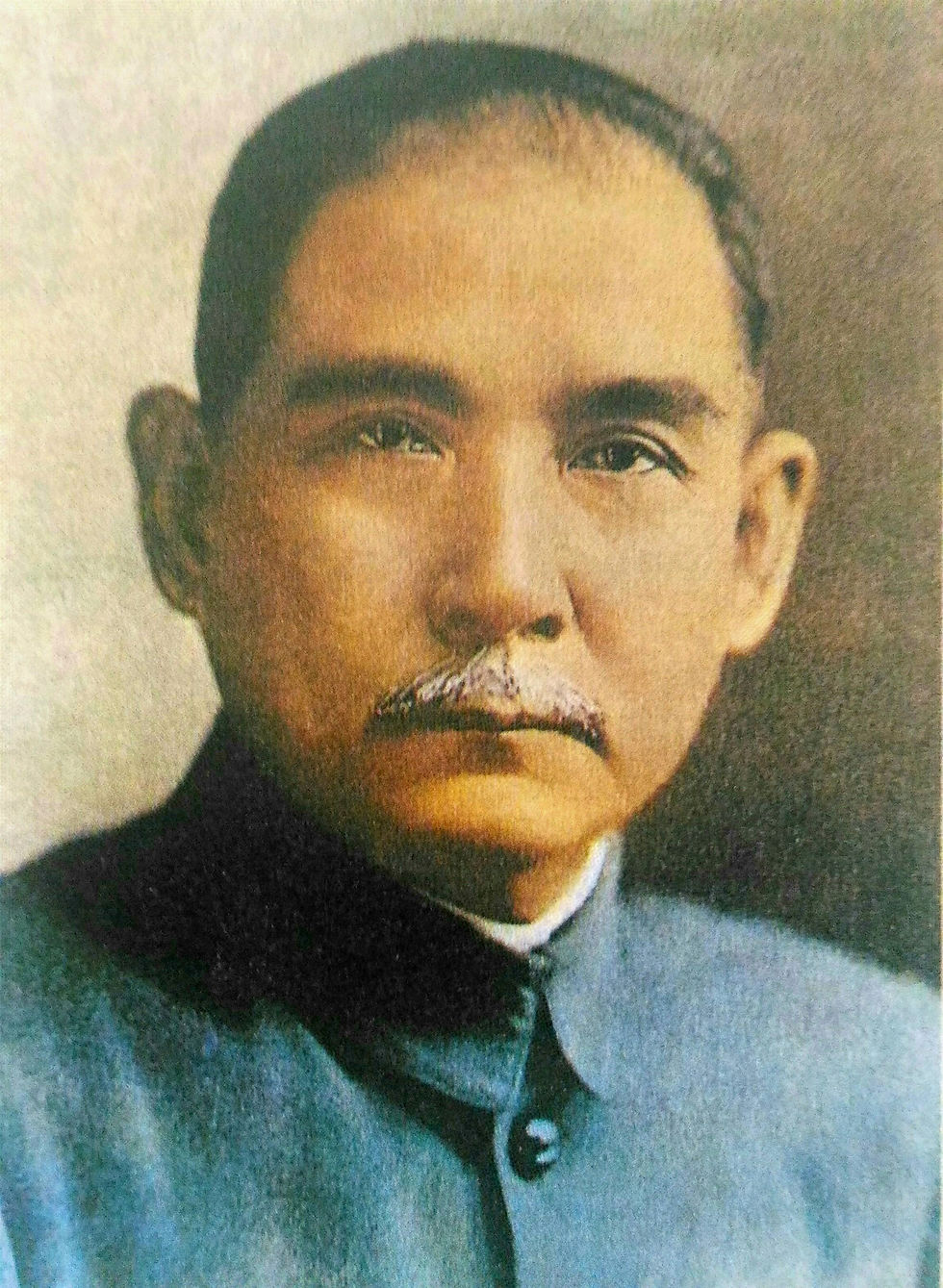
Woodrow Wilson refusal of Sun Yet Sen:
In 1911 the Chinese Republic held its first national assembly and Sun Yat-Sen was elected to the post of Provisional President of The Republic of China. Sun had founded the Nationalist Party. However, with no military backing and little force behind him, he needed muscular assistance. Sun called upon Yuan Shikai, a powerful general and warlord with a huge military following.
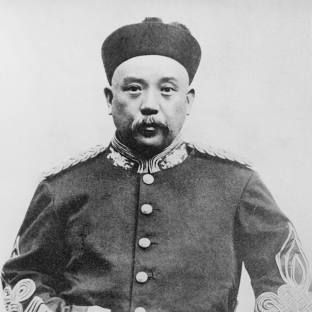
Sun stepped down to allow Yuan Shikai to become President. This led to the rise of the nationalists Kuomintang (KMT). Yuan moved the capital to Beijing, assassinated his enemies and consolidated his power. Yuan Shikai briefly proclaimed himself the Emperor of China in 1915, aiming to restore the monarchy. However, his reign was short-lived, and he was forced to abdicate due to widespread opposition and rebellions. His actions are often seen as a catalyst for the Warlord Era.
Sun Yat -Sen (who may have had US citizenship at one time)(10) had spent many years in exile in the west. He was a dedicated believer in democracy and an admirer of the US Constitution and the American revolution. Wilson denied Sun’s request for US support.
After many empty promises, Wilson chose a “watch and waiting”(11) policy. Charles Kitts in The United States Odyssey In China (1784-1990) states: “Despite the fact that Sun spoke of
10. SOURCE: Sun Yat Sen, 9995; Arrival Investigation Case Files, 1884-1944; San Francisco District Office; Records of the Immigration and Naturalization Service, Record Group 85; National Archives and Records Administration - Pacific Region (San Francisco).During Sun Yat-sen's first trip to North America in 1896 he already had a price on his head as a revolutionary, so it was not surprising that he assumed U.S. citizenship claiming a Hawaii birth place, anticipating any moves that the Chinese Imperial government may make against him. Even so, INS detained him for a lengthy period. After the founding of the Republic, Sun's status changed in that now he was the head of state and the acknowledged leader of China.
11. Betrayed Ally: China in the Great War ,2017 Pen and Sword Books, Christopher Arnander and, Frances Wood
republican and nationalist ideals in an unselfish tone, the official policy of the United States backed Yuan Shikai,(12) the militarist and warlord, and after Yuan died in 1916 , it backed the governments that followed.” (13)
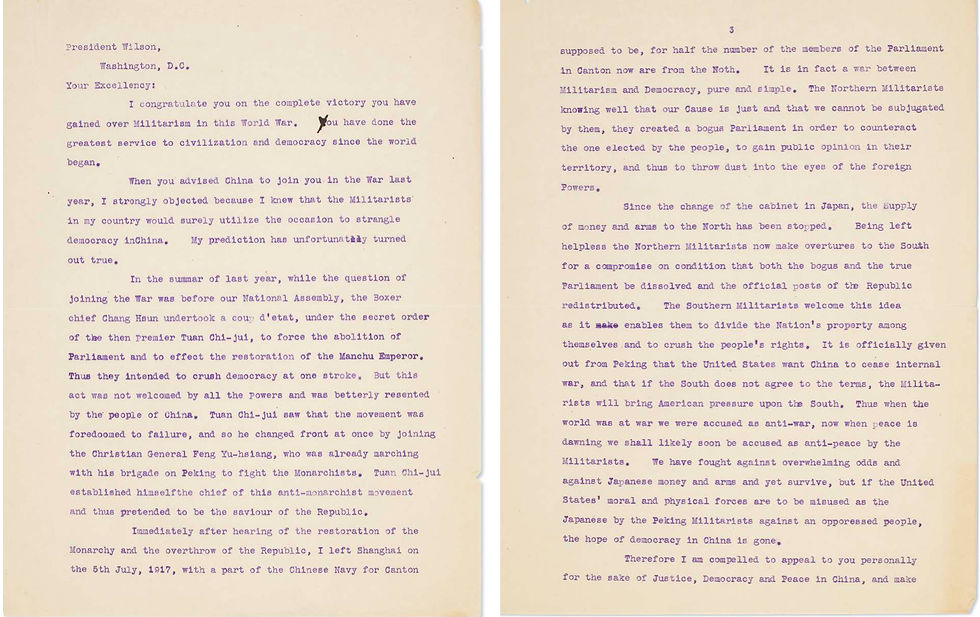
The Chinese republic plunged into the warlord period. Regional warlords of large armies now controlled large territories, bandits roamed free and paid tribute to the warlords. Sun Yat-sen, tried to build a national government. Sun sought international support for his democratic cause . He served again briefly as the president of China and desperately sought help Woodrow Wilson. Wilson again turned his back on Sun .
Woodrow Wilson looms large in the betrayal of China, at the Treaty of Versailles conference, he treated the Chinese delegations as “observers rather than participants”.(14) Wilson did not return the occupied provinces, and completely favored the Western Powers over China. Soon followed the anti imperialist May 4th Movement,(15)with its student unrest. Mao later claimed that this movement was the beginning of the Communist Revolution
12. In 1915-1916, Yuan Shikai attempted to restore the monarchy with himself as emperor, a move that was met with widespread opposition and ultimately failed. His attempt to become emperor is often cited as a major factor in the fragmentation of China into the Warlord Era, as it undermined the fragile republic and led to regionalism and military conflict
13. Kitts, Charles R. The United States Odyssey In China (1784-1990). Lanham, MD: University Press, 1991.
14. Ibid Betrayed Ally: China in the Great War 2017
15. The May Fourth Movement was a Chinese anti-imperialist, cultural, and political movement that began on May 4, 1919, in Beijing, sparked by student protests against the Chinese government's weak response to the Treaty of Versailles, which awarded territories in Shandong province (formerly held by Germany) to Japan. The movement expanded becoming a significant turning point in modern Chinese history, emphasizing nationalism, modernization, and a rejection of traditional Chinese culture .

Truman’s Refusal to Recognize the PRC:
In 1945, immediately after WWII, US representatives in China realized Civil War was inevitable between the nationalist government of Chiang Kai Shek and the Chinese Communists led by Mao. Washington wanted to avert civil war, and acted as mediator between the two sides. President Truman sent General George C. Marshall to China to try to broker peace. Truman also wanted to determine the intentions of the Russians in Manchuria and northern China. Marshall was unsuccessful and he concluded Moscow had neither plans to annex Manchuria or to remain an occupational force in northern China . Marshall became Secretary of State in 1947. He recommended to Truman that the US possessed limited resources. With The American investment in the Marshall plan in Europe, it could not afford to invest large sums of money or millions of American soldiers in an area of “secondary concern”. The US was more concerned with the Russians and the coming Cold War.
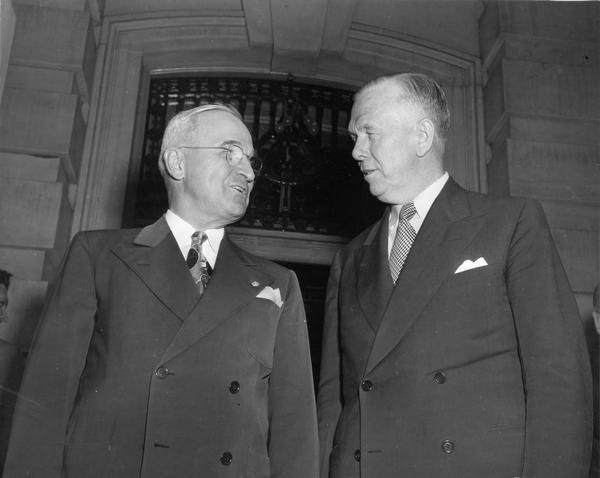
Truman offered Chiang limited financial and material support. He provided the sufficient resources to intensify anti-Americanism among the Communists, but not enough to insure a victory for Chiang. In 1949, the communist’s won the civil war and the defeated Chiang retreated to Taiwan. On November 1 Mao announced the new China, the People's Republic of China. Mao then announced he would align his country with the Soviets.
Truman,. reminiscent of Woodrow Wilson , declared a China policy of “watchful waiting," in where the US government will recognize a government, attractive or not, if they demonstrated control over their own countries

Did The Truman administration intend to recognize the People's Republic and Mao while Chiang’s exiled regime on Taiwan still claimed to be the true government of China? Its hard to say, but Democratic Party congressional leaders feared American backlash in the 1950s midterm elections if the United States abandoned Chang. The Democrats did not want to be accused of responsibility for Chiang’s defeat.
The CIA estimated that Mao’s Communists would invade Taiwan in the summer of 1950, and prevail easily over Chiang forces. Did Truman chose to wait ? We will never know. The midterm congressional elections were looming , the Democratic Truman Administration was more concerned with the congressional victory at home than a winning strategy in China. Possibly Truman planned once Chiang was defeated and the midterm elections were over, the administration could move toward recognition of Mao by the end of 1950. Unfortunately war broke out in a Korea(16) in June 1950 and recognition w as then delayed for nearly 30 years. In addition the United States prevented the PRC from gaining a seat in the United Nations. The Korean conflict , 30 years of confrontations, and possibly even Viet-Nam may have been avoided. Short sighted goals and partisan politics ruined any chance of this. Joseph McCarthy and the Anti Communist HUAC(17) hearings immediately followed, fear ruled the era.
The realistic approach would have been for Truman to recognize the obvious and present Mao with what he already had won, the leadership of China.(18) Republican Eisenhower ran for President in 1952 on an anti communist platform, blaming Truman for “losing China”and being soft on communism.
Eisenhower’s running mate was Richard Nixon, who would go on to use his anti communist bona fides and Henry Kissinger’s strategy of “realpolitik” ( a system of principles based on practical rather than moral or ideological considerations ) to establish a new relationship with Mao and the PRC. An acrimonios relationship, still in flux to this very day.
16. The Korean War was a key test of the ‘Truman Doctrine,’ which committed the U.S. to containing the spread of communism. The war, a proxy conflict in the Cold War, saw the U.S. intervene to prevent North Korea, backed by the Soviet Union and China, from conquering South Korea. This intervention demonstrated the U.S. willingness to use military force to support nations threatened by communist expansion, a central tenet of the Truman Doctrine
17. The period of HUAC's ( House UnAmerican Activities Committee) investigations is often associated with McCarthyism, a term referring to the practice of making accusations of disloyalty, often without sufficient evidence
18. The "loss of China" was portrayed by critics of the Truman Administration as an "avoidable catastrophe". It led to a "rancorous and divisive debate" and the issue was exploited by the Republicans at the polls in 1952. It also played a large role in the rise of Joseph McCarthy,who, with his allies, sought scapegoats for that “loss".

